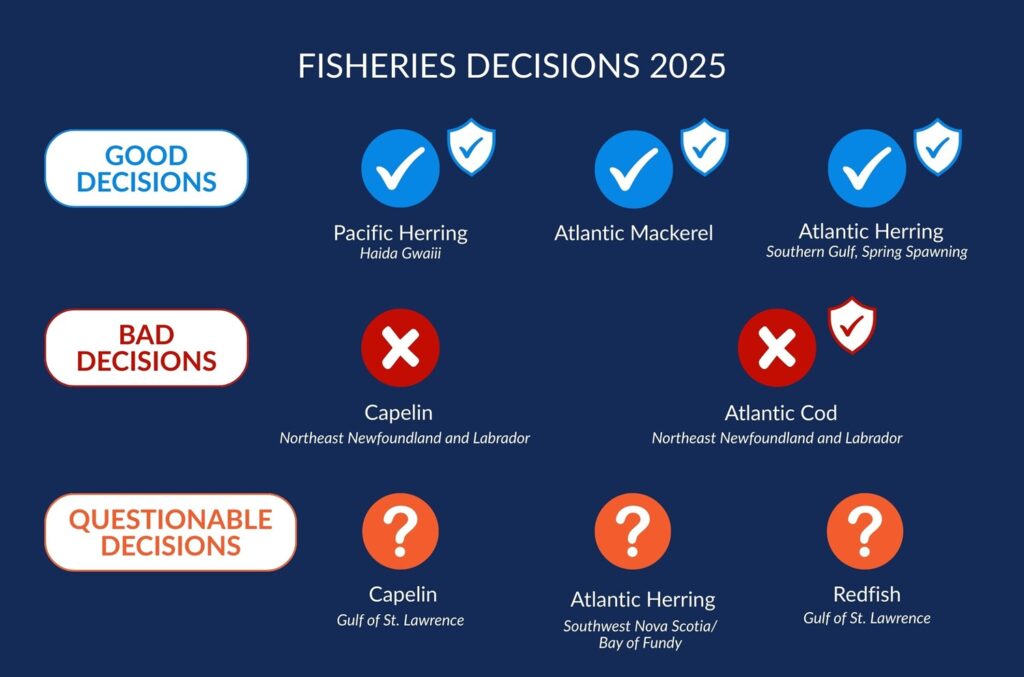August 12, 2025
Watchdogs Needed to Expose Fisheries Mismanagement
Estimated reading time: 0 minutes
BY: Rebecca Schijns
Topics: Rebuild Ocean Abundance
2025 fisheries decisions unfolded with relatively little public attention compared to previous years. More focus was placed on urgent issues including the federal election and trade turmoil on Canada’s southern border. But fisheries decisions matter. Throughout the year, Oceana Canada advocated for good fisheries management. Our team attended government briefings, submitted recommendations and met with harvesters. Fighting to ensure good fisheries practices that support coastal communities and rebuild depleted fish populations. Here’s a recap of this year’s fisheries decisions, highlighting the good, the bad and the questionable.
2025 Fisheries Decisions

Quota decisions following the best available science and the intent of rebuilding stocks to healthy (√), those that did not (X), and those with questionable decisions (?). Shield icons represent stocks that are protected in the Fisheries Act.
The Good (Atlantic mackerel, Southern gulf spring herring, HG herring)
In 2025, a handful of forage fish stocks had good management decisions because of protections under Canada’s Fisheries Act as well as vocal advocates. Depleted Atlantic mackerel, southern Gulf of St. Lawrence herring, and Haida Gwaii herring will all benefit from continuing commercial fishing closures. These difficult but necessary closures allow depleted fish populations to rebuild while still making room for Food, Social and Ceremonial fisheries, and a bait fishery for mackerel.
Rebuilding fish populations is still challenging in Canada. A few voices in the fishing industry continue to call for drastic quota increases on severely depleted populations. Big quotas on depleted populations would devastate the fisheries future. It also puts at risk species that depend on forage fish for food, like whales and seabirds. Thankfully, advocates, including fisheries scientists at Oceana Canada, continue to call for quotas that support healthy oceans and the long-term health of the fisheries. These efforts were critical in securing decisions that align with the Fisheries Act and support growing these fish populations back to healthy levels.
The Bad (2J3KL capelin, Northern cod)
For the fourth year in a row, both Northeast Newfoundland and Labrador capelin and northern cod were examples of bad fisheries management decisions, putting the future of the fishery and overall health of the ocean at risk. Bad decisions were made even though northern cod is protected under the Fisheries Act and capelin is deep in the cautious zone. Fisheries and Oceans Canada (DFO) more than doubled the northern cod quota and rolled over the capelin quota. Increasing cod fishing and keeping high fishing pressure on capelin despite clear scientific evidence that both populations are likely to decline next year.
These decisions reflect a troubling pattern. When fisheries become politicized, science and long-term health is ignored while short-term gains championed by a few take precedence. What’s more troubling is that the fishing quotas could have been even higher without intervention. Oceana Canada, and other stakeholders, were vocal in fighting for the fish. Highlighting evidence as well as policy to show that the current cod and capelin populations can’t sustainably support this year’s large catches.
The Questionable (Redfish, 4RST capelin)
Some 2025 fisheries decisions aren’t as easy to classify as ‘good’ or ‘bad’. For example, redfish in the Gulf of St. Lawrence. Redfish are one of the few healthy stocks in the region. DFO authorized a catch of up to 60,000 tonnes—an unreasonably high amount. This high quota increases the risk of exceeding strict bycatch limits for critically depleted groundfish like cod and white hake. Another questionable decision is the quota roll-over (of more than 10,000 tonnes) for the Gulf of St. Lawrence capelin population. This stock has stagnated for years and still does not have a health status as mandated by DFO’s own policy. Continued fishing of a stock without any guardrails, like a health status, puts the future of this fishery at risk.
Transparency and Fact Checking is Key to Good Fisheries Governance (4VWX herring)
Good fisheries management needs monitoring, sound science, and transparent decision making. It also needs watchdogs who don’t have an economic stake in increasing fishing pressure at all costs. This was made clear this year with Oceana Canada sounding the alarm over the fishing industry withholding data on the largest herring fishery in Canada. Thankfully raising public awareness on the hidden fisheries data worked. Oceana Canada’s advocacy held the fishing industry accountable, resulting in the release of the much-needed information. Now, thanks to this data, the herring stock’s science assessment can continue.
Rebuilding fish
Rebuilt, abundant fisheries are key to healthy oceans and economically resilient coastal communities. Making decisions in the dark without data and against science advice threatens the recovery of fish populations that feed Canadians and a growing and hungry world. As stated by Josh Laughren, Oceana Canada’s Executive Director: “the pressure on the Fisheries Minister over fisheries decisions is enormous, but that doesn’t mean we have to settle for politics interfering in good management.”
Although this year’s fisheries decisions continued the trend of being a ‘mixed bag’, there are clear learnings and hope that change is possible. We know that fisheries decisions are better when stocks are protected under the Fisheries Act rebuilding regulations, but more stocks need the law’s protection. It’s been 1,788 days since the Fisheries Act was passed, yet the majority of Canada’s depleted stocks remain without its legal protection.
Join Oceana Canada in calling for Canada to stop overfishing and rebuild wild fish populations, add your name here.

